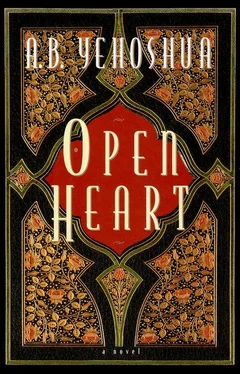A. Yehoshua - Open Heart
Здесь есть возможность читать онлайн «A. Yehoshua - Open Heart» весь текст электронной книги совершенно бесплатно (целиком полную версию без сокращений). В некоторых случаях можно слушать аудио, скачать через торрент в формате fb2 и присутствует краткое содержание. Год выпуска: 2014, Издательство: Peter Halban, Жанр: Современная проза, на английском языке. Описание произведения, (предисловие) а так же отзывы посетителей доступны на портале библиотеки ЛибКат.
- Название:Open Heart
- Автор:
- Издательство:Peter Halban
- Жанр:
- Год:2014
- ISBN:нет данных
- Рейтинг книги:3 / 5. Голосов: 1
-
Избранное:Добавить в избранное
- Отзывы:
-
Ваша оценка:
- 60
- 1
- 2
- 3
- 4
- 5
Open Heart: краткое содержание, описание и аннотация
Предлагаем к чтению аннотацию, описание, краткое содержание или предисловие (зависит от того, что написал сам автор книги «Open Heart»). Если вы не нашли необходимую информацию о книге — напишите в комментариях, мы постараемся отыскать её.
Open Heart — читать онлайн бесплатно полную книгу (весь текст) целиком
Ниже представлен текст книги, разбитый по страницам. Система сохранения места последней прочитанной страницы, позволяет с удобством читать онлайн бесплатно книгу «Open Heart», без необходимости каждый раз заново искать на чём Вы остановились. Поставьте закладку, и сможете в любой момент перейти на страницу, на которой закончили чтение.
Интервал:
Закладка:
And when the birth finally came, between six and seven in the morning, after an additional shot slowly but surely encouraged the cervix to begin to open, like a big red rose — and when in the warm intimacy of our bedroom, where at Michaela’s request the lights had been dimmed, the head of our baby, covered with wildly untidy hair, emerged together with the first signs of a gray London dawn — I began to understand, if not to endorse, Michaela’s stubborn insistence on giving birth at home. Especially since the birth was so smooth and easy. The baby perhaps identifying with Michaela, who had not uttered a single groan of pain all night long, only cried very briefly, and stopped as soon as I cut the umbilical cord and gave her to my mother, who wrapped her in a big towel, her hands trembling with an emotion I had not imagined this logical, unsentimental woman capable of. Afterward, when we recalled these moments, I learned that the emotion which made my mother tremble so much that she almost dropped the baby was due not only to the birth of this baby, with its startlingly hairy, almost devilish head, but also to the distant but vivid memory of the loneliness she herself had felt when I was born, a birth she had not known would be her last. I too was strangely moved by the hairy black head emerging from the bleeding womb, precisely because it was the opposite of the shorn head that had misled me into taking Michaela for a boy when I first met her in the Lazars’ living room. As if by some mysterious process a little of my beloved’s long, abundant hair had grown on my baby’s head, which was now resting dark and shining on my pillow while I waited for the placenta to come out so that I could coolly suture the bleeding tears in the vagina with the needles I had brought from the hospital. I stress the word “coolly” here because even Michaela, who was radiant with joy, could guess how much it had affected me to function as a physician at the birth of my own child. But she had no idea of the price I was soon to extract for having been forced to deal so surgically and directly with her blood, womb, and placenta. And when Stephanie, who had been enthralled by my performance throughout the long night, finally invited my father into the bedroom to see his granddaughter, I didn’t wait to observe the reactions of this good man, who had been sitting quietly, wide awake, in the living room all night long, but hurried to the bathroom to wash off what I felt had besmirched the little love I had for my wife.
So profound and intense was the weariness that had accumulated between the four sides of my personality, that had been active during the long night — physician, husband, father, and son — that I dozed off in the warm, scented bathwater and failed to register the belated arrival of the midwife, who turned out to be a tall dark woman, perhaps of oriental extraction, with a haughty air and white hair. It seemed that there was a prosaic explanation for her mysterious absence. As soon as she received our summons she had set out, but a car had run into her as she was crossing the street and injured her ankle, with the result that she had to spend several hours in the police station and the emergency room. Since she didn’t have our telephone number and we weren’t listed in the phone book, she had no way of contacting us. But her conscience wouldn’t let her go straight home from the hospital, and just as she was, limping painfully on a crutch, she came to keep her promise, accompanied by her young daughter, and to see if she was still needed. Although the birth was already over, Michaela and Stephanie were happy to see her and made her sit down on the armchair in the bedroom — first of all, to tell her in detail about how the birth had gone and how the correct breathing she taught had helped overcome the pain, and second, to ask her to examine the baby and express her opinion. They woke the baby up and laid her naked on the lap of the midwife, who examined her thoroughly and also anointed her with a special oil she had brought with her, after which Stephanie put her back in our bed, next to Michaela. The baby still didn’t have a crib of her own. Although Michaela had purchased all the necessary equipment, she had left it all in the department store, in order not to arouse the jealousy of mysterious evil forces until the birth had been safely accomplished. “I don’t believe it,” said my father to Michaela in genuine astonishment. “A rational, liberated woman like you, believing in mysterious evil forces?”
“Of course I don’t want to believe in mysterious forces,” replied Michaela jokingly, “but what can I do if they believe in me?” Stephanie and Michaela praised me to the skies to the midwife, who examined the cervix, praised my stitches, but could not hide her disapproval of the injections I had given Michaela to induce the birth. Why was I in such a hurry? she wanted to know. Nature had a rhythm of its own. If I had not induced the birth, perhaps she would have arrived in time to deliver the baby herself. Who knows whether she was thinking of the fee she had lost or her professional enjoyment, or perhaps of both.
But none of this mattered now. My father’s face was crumpled with fatigue, and my mother asked me to call a taxi for them, because she didn’t want to put me out. But I insisted on driving them home myself, and I went to get the car from its parking place behind the chapel, trying to engrave on my memory the details of the foggy London street, which looked like a set from an old English movie, so that I could tell Shiva when she grew up about the morning of her birth. Outside the garden gate of the pretty house where my parents were staying, my mother, who was still wide awake, suddenly suggested that she would go back to be with Michaela while I snatched a few hours’ sleep on her bed, next to my father. I don’t know if it was the somber expression on my face that worried her, or if she was already missing the new baby, but I refused. Although I could have done with a few hours’ sleep in their pleasant room, surrounded by the bourgeois quiet of the English house, I didn’t know how Michaela would react to my desertion only a few hours after the birth of the baby, and I said good-bye to my parents, who embraced me warmly. I knew that they were very happy now, and the dense fog surrounding us, which reminded them of their childhood, only increased their happiness. They were bursting with pride in my successful delivery of the baby, after all their fears. I too was pleased with myself, and on the way home, as I glided slowly and carefully between the little milk vans, I wondered what to say in the monthly report I sent to Lazar’s secretary about my work in the London hospital. Should I mention the fact that I had delivered the baby by myself at home, which might be interpreted by a certain person as excessive intimacy in my relations with Michaela, or should I simply announce the fact of Shiva’s birth, so that she, the distant and impossible beloved, would know that the way was open for her to renew our sweet and secret relations, now that she was doubly protected against me?
But when I reached home, I thought that perhaps I should have accepted my mother’s offer to go to sleep in their room after all, for Michaela and Stephanie were still deep in animated conversation with the midwife, who in spite of the pain in her ankle was sitting in our bedroom with her daughter, drinking her second or third cup of tea, holding not our baby but the little Indian statuette with its many outflung arms between her hands and speaking now not of births and babies but of life itself, its purpose and meaning, a subject on which I was invited to give my opinion. Stephanie poured me a cup of tea, and I took off my shoes and lay down on the bed, crushed between five women, counting the fingers and toes on my new daughter, who lay next to me blinking her eyes. I discovered that Michaela and Stephanie had good reason for being under the spell of this midwife, who turned out to be an original woman with an eloquent style of speech and strange and diverting ideas. Beyond the practical, competent professional veneer lay a fervent belief in the transmigration of souls, and not necessarily after death but in the midst of the bustle and flow of life. Her idea of the soul was of something flimsier and lighter than the conventional notion, for she removed the heavier parts, such as memory, and left only the anxieties and aspirations, which allowed it to drift slowly around and also to migrate deliberately from place to place and person to person. For example, she said that when her ankle had been injured in the evening and she had been taken to the hospital and realized that she wouldn’t be able to reach us in time, she had sent her soul to enter into those present in this room, especially into me. Hadn’t I felt, she asked me, that I had done things more easily and confidently than I had ever done them in my life before? “Yes, I did feel that,” I admitted honestly. “But if your soul entered into me,” I asked innocently, with an exhausted smile, “where was my soul? Surely I didn’t have two souls inside me last night?”
Читать дальшеИнтервал:
Закладка:
Похожие книги на «Open Heart»
Представляем Вашему вниманию похожие книги на «Open Heart» списком для выбора. Мы отобрали схожую по названию и смыслу литературу в надежде предоставить читателям больше вариантов отыскать новые, интересные, ещё непрочитанные произведения.
Обсуждение, отзывы о книге «Open Heart» и просто собственные мнения читателей. Оставьте ваши комментарии, напишите, что Вы думаете о произведении, его смысле или главных героях. Укажите что конкретно понравилось, а что нет, и почему Вы так считаете.












